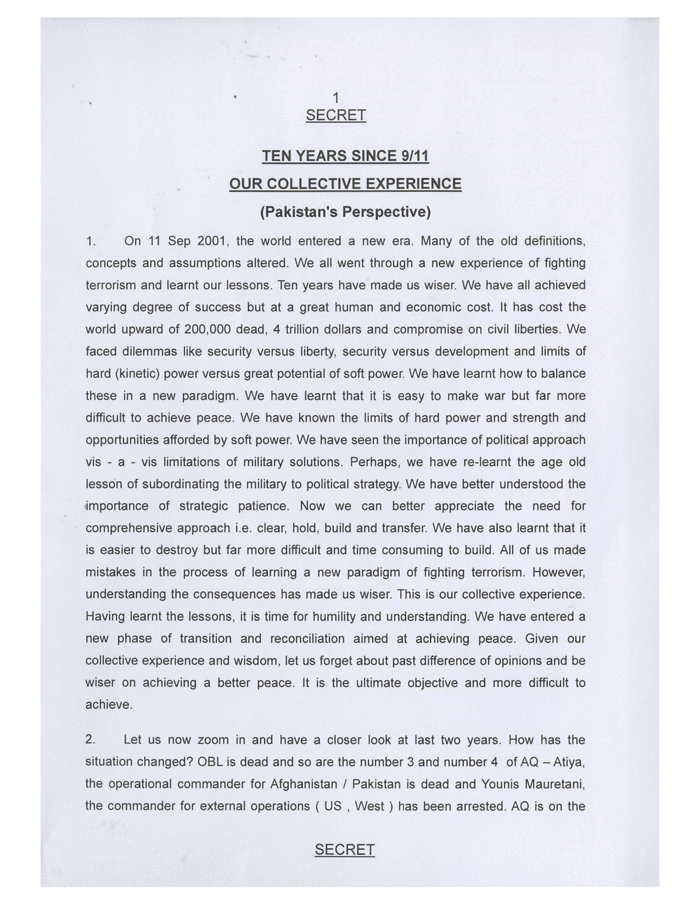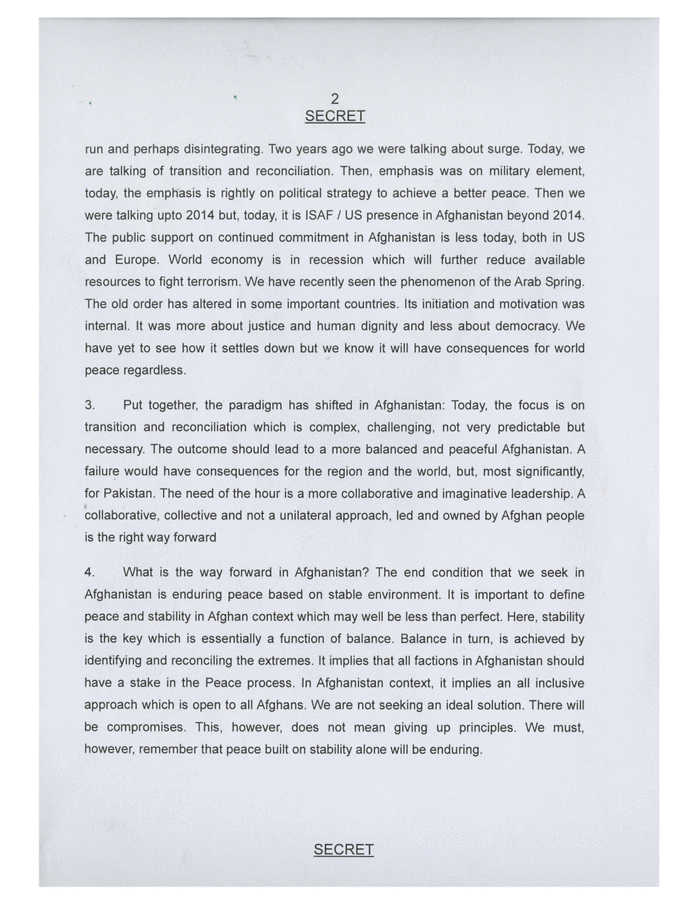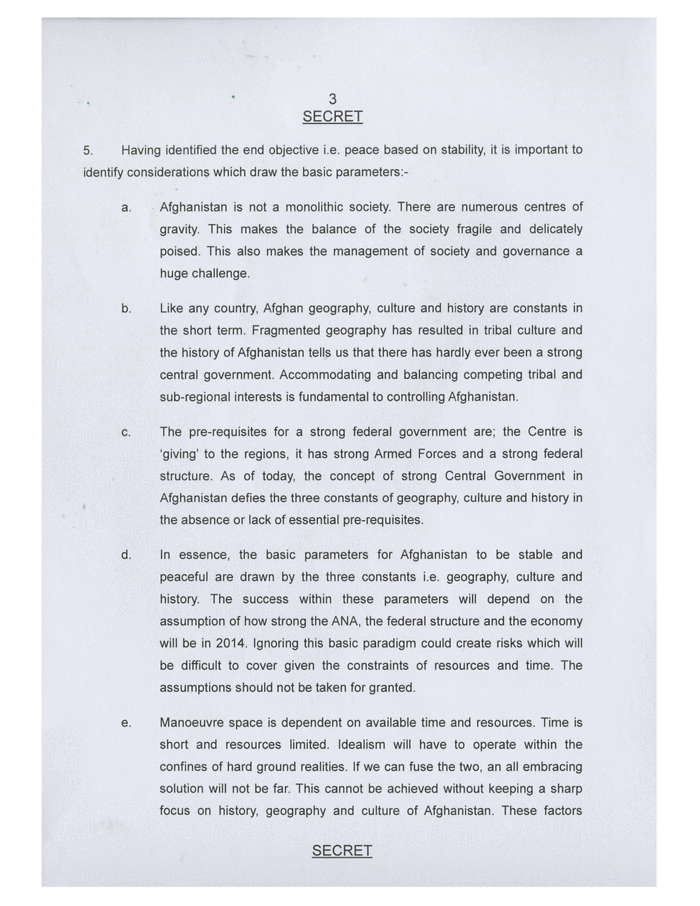
“I think it’s important for us to get it right,” President Obama said on Tuesday of the American relationship with Pakistan. Lately, though, we haven’t. After 2009, the United States and Pakistan constructed what they called a “strategic dialogue”—addressing Pakistan’s needs for economic growth, its search for energy and water security, Afghanistan, and possible negotiations with the Taliban—to define and solidify a long-term partnership. Three years later, those ambitions are in tatters, undone by the Raymond Davis affair, the killing of Osama Bin Laden, and continuing drone strikes, which most Pakistanis regard as acts of war.
In late February, I travelled to Pakistan and met with a number of military officers there, including several senior ones. They explained how they saw, from their side, the rise and collapse of the strategic dialogue with Washington.
It is a story laced with the generals’ resentments, geopolitical calculations, fears, and aspirations. Listening to them after absorbing the recent months of Pakistan ennui and Pakistan bashing in Washington was like watching one of those movies where a single narrative is told and retold selectively, from irreconcilable points of view.
Some of the basics of the Pakistan Army’s arguments about the Afghan war and the struggle against Al Qaeda-influenced terrorist groups are contained in a twelve-page document called “Ten Years Since 9/11: Our Collective Experience (Pakistan’s Experience).” The document, labelled “Secret,” is below; it has not previously been published.
Despite its classification, the essay is perhaps best understood as part of a Pakistani strategic communications or lobbying campaign. (Presumably, the sources that provided the document to me were undertaking an act in that campaign.) This particular text was a basis for briefings that General Ashfaq Kayani, the powerful Army chief, provided to NATO leaders at closed meetings last September, around the tenth anniversary of the 2001 attacks. It updates a case Pakistani generals have been making in meetings with their counterparts for years: that the casualties, economic disruption, and radicalization Pakistan has suffered from because of spillover from the American military campaign in Afghanistan are deeply underappreciated. The essay declares that Pakistan’s total casualties—dead and wounded—since 2001 in the “fight against terrorism” number about forty thousand.
Because of its record of past lying about its covert-action programs (and other matters), the Pakistani military does not engender much trust. One question, then, is whether this document represents a reliable expression of what the Pakistani security services actually believe—as opposed to what Pakistan’s generals have learned that the world wants to hear from them.
But there is another question: what are the implications for NATO’s exit strategy from Afghanistan if Pakistan’s military means what this document says—or at least some of what it says?
The document, written in a pleasing form of South Asian English, provides an outline of Pakistan’s political analysis and assessment of the Afghan war, asking, “How should success be measured?” It offers four criteria:
Are policy options opening or getting restricted?…Are we gaining or losing the public support[?]…Is the military strategy creating necessary conditions to help political strategy (military strategy is not an end in itself)…Are the constraints of time and resources being met?
The answers to those four questions, if they are asked about the NATO campaign in Afghanistan this spring, are depressing.
Elsewhere, the essay provides glimpses of Pakistan’s deeply cautious position on negotiating with the Taliban. Pakistan’s timeline in Afghanistan extends much longer than that of NATO, which has announced that it is leaving by 2014. Pakistan will always be a neighbor, so its generals see no reason to rush into endgame talks that they cannot control or predict. “Pakistan is prepared to help,” the document says. “However, the extent of this help should be correctly appreciated. We can facilitate but not guarantee. Ultimately it will remain Afghan responsibility.”
Many Afghans, who have suffered immeasurably during the past thirty years because of Pakistani interference, doubt that the Pakistani security services have anything constructive in mind. Pakistan’s Inter-Services Intelligence Agency, or I.S.I., has backed Islamist militias fighting in Afghanistan since the 1980s, and there is evidence that the I.S.I. continues to harbor the Taliban. “Ten Years Since 9/11” lays out various ideas for winding down the Afghan war; how fully those align with what Pakistan actually does on the ground is another question.
The document is silent about the most toxic subject in U.S.-Pakistani relations: America’s determination to continue firing missiles from drones at those it has identified as militants inside Pakistan without seeking Pakistan’s permission.
Pakistan’s generals told me that while they have, in fact, quietly sanctioned some American drone operations against Pakistani militants, they have never issued approval for lethal strikes carried out unilaterally by the United States—they only sanctioned aerial surveillance in defined areas. The generals say that they are willing to use Pakistani F-16s loaded with precision weapons to strike at Al Qaeda targets identified with intelligence from the United States—a form of partnership that would not violate their pride or sovereignty because it would be the Pakistani military carrying out operations against its own enemies. In the past, the U.S. has been reluctant to share such intelligence with Pakistan, because it has sometimes leaked, allowing the target to escape. The Obama Administration has signalled to Pakistan’s military leadership that it is willing to try again, but has urged the Pakistanis to accept that the U.S. reserves the right to attack any target that threatens American lives or other important interests. I was told that at least one operation of this type—a tip from American intelligence, leading to a strike in the Federally Administered Tribal Areas by Pakistani aircraft—has been carried out without publicity this year.
Pakistan’s generals believe that one chronic problem is America’s drone-targeting policy. Many lethal drone strikes are not directed against a specific terrorist whose name is known and whose real-time location has been pinpointed. There are a few cases like that, but often the American drones strike more adaptively at what are known as “force protection” and “signature” targets.
A force-protection target can be a truck full of bearded men wearing turbans and holding rifles, driving toward the Afghan border. There are, as it happens, more than a few of these.
A signature target can be a house in North Waziristan where many bearded men wearing turbans and carrying arms gather for dinner, chatting on their phones. The U.S. drone operators may listen in and watch over such a suspicious-looking dinner party, and, back at Drone Central, officers on duty may conclude there is sufficient cause to fire missiles at the house—but they could have little or no idea about the names of all the guests. The Americans insist that signature drone strikes of this kind are necessary because that is how the United States has regularly, semi-accidentally killed Al Qaeda leaders along the Pakistani border in recent years, resulting in a reduction of Al Qaeda’s global capability. But they have also semi-accidentally killed Pakistanis who are not tied to Al Qaeda.
The generals I met were somewhat understanding about the signature-target policy, at least where Al Qaeda is involved, but they were unyielding in their resentment of American unilateralism, and the violations of Pakistani sovereignty and dignity that drone strikes present.
As for force-protection targets, the Pakistanis ask why the American military can’t just track hostile trucks that might be heading for war in Afghanistan until they cross the border—and then strike them on Afghan soil.
Most analysts acknowledge that unilateral, cross-border drone strikes are destabilizing Pakistan. Yet Pakistan’s stability remains a putative goal of the American military campaign in Afghanistan. American troops must be in Afghanistan to help assure, through Al Qaeda’s defeat, the long-term stability of nuclear-armed Pakistan, but in order for the American troops to protect themselves, they must destabilize Pakistan. Is America destroying villages in order to save them again?
The tone of “Ten Years After 9/11” is not so sharp. Strategic thinkers in the Pakistani military constructed the document to coax sympathy from NATO governments on whom they continue to depend in some respects, and it includes a measured, sensible call for “humility and understanding.” At the same time, many in the Pakistani élites hold a firm conviction: that the logic chain of the American military campaign is broken.






